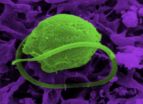(Press-News.org) HOUSTON – A previously invincible mutation in chronic myeloid leukemia (CML) has been thwarted by an investigational drug in a phase I clinical trial reported in the current edition of The New England Journal of Medicine.
All 12 patients in the trial with chronic phase CML and the T315I mutation had a complete hematologic response (absence of CML cells in the blood) after treatment with ponatinib. Eleven had a major reduction in CML cells in the bone marrow and nine achieved a complete cytogenetic response – no cells in the marrow.
T315I is present in up to 20 percent of patients and blocks the docking station where three other successful CML drugs normally connect to the mutant protein.
Ponatinib also induced high response rates among the broader group of patients who had mutations other than T315I or no detectable mutations. Among 65 patients with relapsed or resistant CML at varying stages of the disease or with Philadelphia-chromosome positive acute lymphoblastic leukemia (ALL), 67 percent with other mutations and 46 percent with no mutations achieved a complete cytogenetic response.
“Ponatinib is a promising new treatment for patients who have run out of options and its activity against other resistant mutations and in patients with no known mutations suggests a broad range of efficacy for this drug,” said trial principal investigator Jorge Cortes, M.D., professor in The University of Texas MD Anderson Department of Leukemia.
Cortes will report the results of a pivotal phase II clinical trial of ponatinib at the 54th ASH Annual Meeting and Exposition in December.
The U.S. Food and Drug Administration in October accepted a new drug application by ARIAD Pharmaceuticals for accelerated review of ponatinib for patients with resistant or intolerant CML or Philadelphia chromosome-positive acute lymphoblastic leukemia (ALL).
Targeted therapy success story
CML is caused by the abnormal gene BCR-ABL, which occurs when two chromosomes swap portions of their DNA from the BCR and ABL genes during cell division. This abnormality is called the Philadelphia chromosome and the resultant BCR-ABL fusion protein drives the overproduction of white blood cells that characterizes CML. BCR-ABL is a tyrosine kinase, a type of protein that acts as an on-off switch by attaching a phosphate group to other proteins.
Discovery of the drug imatinib (Gleevec) revolutionized treatment of CML. Now approximately 90 percent of patients survive for at least five years, up from about 50 percent before imatinib. Two second-generation drugs, nilotinib (Tasigna) and dasatinib (Sprycel) are more potent than imatinib. Each can be used in frontline therapy.
"Imatinib is a terrific drug, however 30-40 percent of CML patients become resistant to it," Cortes said. "Nilotinib and dasatinib work for 40-50 percent of these patients."
Preclinical experiments indicated ponatinib acts against BCR-ABL and all known mutant forms of the protein.
Ponatinib active against known mutations and no mutations
The phase I trial enrolled 81 patients with blood cancers at five centers, 60 with CML and five with Philadelphia Chromosome-positive ALL. The patients had relapsed or resistant disease and 91 percent had been treated with at least two of the approved drugs. Median follow-up was 56 weeks.
Among 43 chronic phase CML patients, 42 had complete hematological response, 31 (72 percent) had a major cytogenetic response, 27 (63 percent) had a complete cytogenetic response (no CML cells in the bone marrow) and 19 (44 percent) achieved major molecular responses.
Duration of response for chronic phase patients with major cytogenetic response ranged from 8 to 117 weeks, with median duration yet to be reached.
Patients treated within 0 to 5 years of diagnosis had better response rates than those treated with ponatinib 5 to 24 years after diagnosis.
More than 60 percent of the 15 patients in chronic phase CML with non-T315I mutations and 13 with no detectable mutations achieved a major cytogenetic response.
All 12 of the chronic phase CML patients with T315I remained on the study at the time of analysis.
Of 22 patients with advanced CML (accelerated or blast stages) eight had a major hematological response, seven a major cytogenetic response and two a major molecular response.
Seven patients had advanced CML and the T315I mutation. Two achieved major hematologic response, two major cytogenetic responses and two major molecular responses.
The dose escalation trial started at a daily oral dose of ponatinib of 2 mg ranging up to 60 mg. The investigators settled on a 45mg dose.
The most common non-hematologic side effects were skin disorders, fatigue and nausea at the lower grade 1 or 2 levels. Pancreatitis occurred in 11 patients and was a serious adverse event in eight. Nine of the 11 experienced one episode of pancreatitis, only two discontinued treatment.
Twelve patients with acute myeloid leukemia also participated in the trial. A separate paper will address those results.
INFORMATION:
Co-authors with Cortes are Hagop Kantarjian, M.D., of MD Anderson's Department of Leukemia; Neil Shah, M.D., Ph.D., University of California, San Francisco; Dale Bixby, M.D., Ph.D., and Moshe Talpaz, M.D., University of Michigan Comprehensive Cancer Center; Michael Mauro, M.D., and Brian Druker, M.D., Oregon Health & Science University Knight Cancer Institute; Ian Flinn, M.D., Ph.D., Sarah Cannon Research Institute, Nashville, Tenn., Thomas O'Hare, Ph.D., and Michael Deininger, M.D., Ph.D., Huntsman Cancer Institute, University of Utah; and Simin Hu, Ph.D., Narayana Narasimhan, Ph.D., Victor Rivera, Ph.D., Tim Clackson, Ph.D., Christopher Turner, M.D., and Frank Haluska, M.D., Ph.D., all of ARIAD Pharmaceuticals, Cambridge, Mass.
The study was supported by ARIAD Pharmaceuticals. Cortes has received research support from and consulted for ARIAD.
END
LOS ANGELES (Nov. 28, 2012) – Cedars-Sinai Heart Institute researchers have found in an initial clinical trial that a drug typically prescribed for erectile dysfunction or pulmonary hypertension restores blood flow to oxygen-starved muscles in patients with a type of muscular dystrophy that affects males, typically starting in childhood or adolescence.
Tadalafil, commonly known by brand names Cialis and Adcirca, reversed the effects of a biochemical chain of events that in Becker muscular dystrophy deprives muscles of an important chemical, nitric oxide, which normally ...
LOS ANGELES — EMBARGOED UNTIL 1 P.M. EST ON WEDS. NOV. 28, 2012 – Surgical teams at Cedars-Sinai have reduced surgical site infections by more than 60 percent for patients who undergo colorectal procedures by introducing evidence-based protocols that are easy to follow and relatively low in cost.
Surgeons, nurses, operating room staff and patients all collaborated in a quality improvement project that measured surgical site infection rates from March 2011 to March 2012. Several new steps were introduced to guard against infections, and these have now been expanded and ...
Microscopic animals held algae captive and stole their genes for energy production, thereby evolving into a new and more powerful species many millions of years ago reveals a new study published today in the journal Nature.
The results reveal a 'missing link' in evolution because the tiny animal thieves (protozoa) couldn't completely hide all evidence of the captive algae, and have been effectively frozen in time and caught in the act by genetic sequencing.
The protozoa captured genes for photosynthesis- the process of harnessing light to produce energy which is used ...
Thanks to NASA's Cassini spacecraft which has been orbiting Saturn since 2004, scientists have been able to observe for the first time ever the seasonal atmospheric circulation direction change on Titan – an event which only happens once every 15 years and is never observable from Earth. Their findings are published today in Nature.
Titan, while technically only a moon, is bigger than the planet Mercury, and is often considered a planet in its own right. It is the only known moon to have a significant atmosphere and is one of only four terrestrial atmospheres in our ...
Scientists have developed a new approach for evaluating past climate sensitivity data to help improve comparison with estimates of long-term climate projections developed by the Intergovernmental Panel on Climate Change (IPCC).
The sensitivity of global temperature to changes in the Earth's radiation balance (climate sensitivity) is a key factor for understanding past natural climate changes as well as potential future climate change.
Many palaeoclimate studies have measured natural climate changes to calculate climate sensitivity, but a lack of consistent methodologies ...
(Boston) – In a perspective article to appear in the Nov. 29 issue of the New England Journal of Medicine, researchers from Boston University Schools of Medicine and Public Health (BUSM and BUSPH) report that health-care providers can play a critical role in helping to reduce and prevent intimate partner violence (IPV) by screening and referring patients to appropriate resources.
The U.S. Centers for Disease Control and Prevention recently released a comprehensive report on the prevalence of sexual violence, stalking and IPV in the U.S. The report relays the alarming ...
Boston, MA – An analysis of newly released polls shows that most of those who voted for President Obama in the 2012 election favor implementing the Affordable Care Act (ACA) and want the federal government to continue efforts to make sure most Americans have health insurance coverage. However, at the same time the President was re-elected, Republicans maintained a majority in the U.S. House of Representatives, and 30 of the nation's 50 states will have Republican governors. The polls suggest that those who voted for these Republican officeholders, and therefore many of ...
University of Alberta researchers discovered that elk are more frequently and more easily disturbed by human behaviour such as ATV drivers than by their natural predators like bears and wolves.
The U of A researchers, led by biologist Simone Ciuti, spent 12 months in southwestern Alberta. The study involved elk herds, made up of females and their off-spring. The researchers observed the animals' reactions to different rates of human disturbances in the form of vehicle traffic on nearby roads and off-road, all-terrain vehicles.
The elk in the study were found on a variety ...
Cold Spring Harbor, NY – Bread wheat (Triticum aestivum) is one of the "big three" globally important crops, accounting for 20% of the calories consumed by people. Fully 35% of the world's 7 billion people depend on this staple crop for survival. Now an international team of scientists, including a group from Cold Spring Harbor Laboratory (CSHL), has completed the first comprehensive analysis of its full genome.
The study reveals the evolution of bread wheat from ancestral strains through to its current domesticated form. Due to the complexity of the plant's genome the ...
Scientists have unlocked key components of the genetic code of one of the world's most important crops. The first analysis of the complex and exceptionally large bread wheat genome, published today in Nature, is a major breakthrough in breeding wheat varieties that are more productive and better able to cope with disease, drought and other stresses that cause crop losses.
The identification of around 96,000 wheat genes, and insights into the links between them, lays strong foundations for accelerating wheat improvement through advanced molecular breeding and genetic engineering. ...


